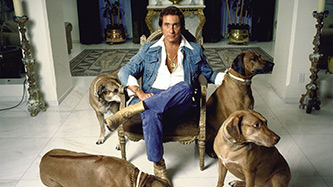I was hoping to not write this letter to you. Not writing to you would have meant that Barry Aldrich's documentary Filthy Gorgeous: The Bob Guccione Story had made some interesting choices (successful or not) and didn't simply rip off its musical stylings from Boogie Nights. Sadly, as the films opened with Penthouse _founder Bob Guccione photographing a nude model, The Chakachas' _Jungle Fever started to play and I felt my heart sink.
Not that there's anything intrinsically wrong with taking inspiration from other sources. Boogie Nights itself clearly took its cue from Martin Scorsese's approach to building a soundtrack. But the film has to make the music an integral part of the storytelling, not mere sonic wallpaper that happens to have been released around the time the story is taking place. Unfortunately, this unimaginative approach to scoring a film with pop songs is symptomatic of Filthy Gorgeous's overall problems. There's an interesting story here; it's just not interestingly told.
For a documentary that seems to aspire to showcase the many facets of_ Bob Guccione -pornographer, artist, renaissance man! - this is a very surface-level enterprise. There's a lot of talk of Bob Guccione in this film, but not much of Guccione himself (the fact that he died in 2010 doesn't mean he can't be a presence; Roger Smith's shadow was cast over every scene in Michael Moore's _Roger and Me, and he never formally appeared in the film--then again, maybe that's because Moore's film is all about the effect's Smith's business decisions have on the film's subjects, while Filthy Gorgeous _is focused on events that happened _to Guccione; simply put, he's not the protagonist of his own story).
Much like the use of music, there's another stylistic decision that undermines what Aldrich is (I think) trying to accomplish. Structurally, Guccione's life is divided into segments based on his business endeavours: starting Penthouse _magazine; the artistic and financial disaster that was _Caligula; expanding his publishing empire to include Omni and other more mainstream titles (before its collapse and eventual bankruptcy). It all feels like it should have the pop culture zip of a triple-X take on _Citizen Kane, _but while the various interviewees (including Guccione's two sons) speak often of his desire, passion, and stubbornness when it came to topics like art, journalism, and liberty, we're constantly missing the detail that creates a truly personal portrait.
Consider the fact that Bob Guccione Jr. is a producer of this film, yet spent most of the last 20 years of his father's life estranged from him.
What more could he tell of his father's story than the scantest surface details? And what more could your soundtrack do than score those moments in the most obvious, uninteresting way?
Hoping for a new beat,
Casey







